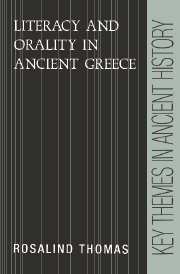Book contents
- Frontmatter
- Contents
- List of figures
- Acknowledgements
- List of abbreviations
- 1 Introduction
- 2 Literacy and orality
- 3 Oral poetry
- 4 The coming of the alphabet: literacy and oral communication in archaic Greece
- 5 Beyond the rationalist view of writing: between ‘literate’ and ‘oral’
- 6 Orality, performance, and memorial
- 7 Literacy and the state: the profusion of writing
- Epilogue: the Roman world
- Bibliographical essay
- Bibliography
- Index
5 - Beyond the rationalist view of writing: between ‘literate’ and ‘oral’
Published online by Cambridge University Press: 18 January 2010
- Frontmatter
- Contents
- List of figures
- Acknowledgements
- List of abbreviations
- 1 Introduction
- 2 Literacy and orality
- 3 Oral poetry
- 4 The coming of the alphabet: literacy and oral communication in archaic Greece
- 5 Beyond the rationalist view of writing: between ‘literate’ and ‘oral’
- 6 Orality, performance, and memorial
- 7 Literacy and the state: the profusion of writing
- Epilogue: the Roman world
- Bibliographical essay
- Bibliography
- Index
Summary
INTRODUCTION: BEYOND THE WRITTEN MESSAGE
It is frequently taken for granted that writing will be used to communicate and store information, to create documents and books which have obvious recognized functions, or generally that it will serve as a vehicle for rational thought. It is also assumed that writing simply conveys the message of its written content without any further meaning; or that written communication, almost exclusively now on paper (or disk), is predictably uniform in its significance. But such modern perceptions may not always be appropriate for the ancient world. The symbolic or non-documentary use of writing is often recognized in other cultures. Scholars are strangely reluctant to see it in ancient Greece except in the unavoidable region of magic. This chapter aims to explore these neglected aspects of writing which do not conform to the straightforward (and modern) expectations of historians: one might perhaps call these ‘non-literate’ uses of writing, in order to underline their distance from what are usually felt to be the normal uses of literacy. Writing is not a neutral and autonomous medium.
I shall argue that Greek (and indeed Roman) writing has many forms and functions — symbolic and magical, for example — which take us beyond the message contained merely in the written content of the document; secondly, that the written word in the ancient world often has such a close relationship to the background of oral communication that it cannot properly be understood in isolation from that background; thirdly, that the use of written documents is dependent partly on experience, partly on the way writing is seen by contemporaries, and partly on the very nature of oral communication: thus that the value and use of a written document (and even whether written documents are made in the first place) change considerably in the course of Greek history.
- Type
- Chapter
- Information
- Literacy and Orality in Ancient Greece , pp. 74 - 100Publisher: Cambridge University PressPrint publication year: 1992

